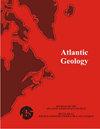U-Pb geochronology and geochemistry from the northeastern New River belt, southern New Brunswick, Canada: significance of the Almond Road Group to the Ganderian platformal margin
IF 0.9
4区 地球科学
Q2 GEOLOGY
引用次数: 3
Abstract
The Almond Road Group in the northeastern New River belt comprises two formations: the basal Snider Mountain Formation contains orthoquartzite, feldspathic quartzite, and quartzite pebble conglomerate; the gradationally overlying Ketchum Brook Formation is composed of feldspathic sandstone, laminated dark siltstone and shale, overlain by mafic lithic tuffs and basaltic flows. The Almond Road Group overlies latest Ediacaran to earliest Cambrian (early Fortunian) pyroclastic, volcaniclastic, and epiclastic rocks of the Belleisle Bay Group. Based in part on this relationship, the Almond Road Group was thought to be Early Cambrian, although an upper age limit had never been determined. A U–Pb (zircon) age of 475 ± 2 Ma for the West Scotch Settlement porphyry, a small felsic hypabyssal intrusion emplaced into the Ketchum Brook Formation, demonstrates that the Almond Road Group is no younger than Early Ordovician (early Floian) age. Its age is further constrained by LA ICP-MS detrital zircon data from a basal quartzite in the Snider Mountain Formation. Results show a dominant peak in the Ediacaran (ca. 575 Ma), with the youngest coherent cluster of ages at ca. 530–520 Ma. Together these data support a Cambrian age for the quartz-rich Almond Road Group and its platformal relationship to Ganderia.加拿大新不伦瑞克省南部新河带东北部的U-Pb地质年代和地球化学:阿尔蒙德路群对甘德地台边缘的意义
新河带东北部的Almond Road组由两个地层组成:基底Snider山地层包含正石英岩、长石石英岩和石英岩卵石砾岩;Ketchum Brook组由长石砂岩、层状深色粉砂岩和页岩组成,上覆镁铁质岩屑凝灰岩和玄武岩流。Almond Road岩群位于Belleisle湾岩群的最新埃迪卡拉纪至最早寒武纪(早Fortunian)火山碎屑岩、火山碎屑岩和表碎屑岩之上。部分基于这种关系,杏仁路群被认为是早寒武纪,尽管年龄上限从未确定。West Scotch沉降斑岩的U–Pb(锆石)年龄为475±2 Ma,这是一种侵位在Ketchum Brook组中的小型长英质浅成侵入体,表明Almond Road群的年龄不早于早奥陶世(早Floian)。Snider山组基底石英岩的LA ICP-MS碎屑锆石数据进一步限制了其年龄。结果显示,埃迪卡拉纪(约575 Ma)有一个主峰,最年轻的相干年龄群约为530–520 Ma。这些数据共同支持富含石英的杏仁路群的寒武纪时代及其与甘德岩的平台关系。
本文章由计算机程序翻译,如有差异,请以英文原文为准。
求助全文
约1分钟内获得全文
求助全文
来源期刊

Atlantic Geology
GEOLOGY-
CiteScore
2.10
自引率
18.80%
发文量
0
审稿时长
>12 weeks
期刊介绍:
Atlantic Geology (originally Maritime Sediments, subsequently Maritime Sediments and Atlantic Geology) covers all aspects of the geology of the North Atlantic region. It publishes papers, notes, and discussions on original research and review papers, where appropriate to the regional geology.
 求助内容:
求助内容: 应助结果提醒方式:
应助结果提醒方式:


